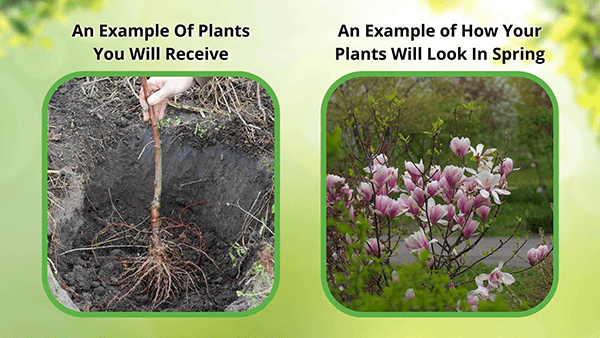Black Walnut Trees For Sale
The black walnut tree is highly regarded for its striking, deep-brown to black bark and its vigorous growth habit. As it matures, it forms a round crown of branches and leaves as wide as the tall tree.
This tree is well-suited to shading large landscapes alone or in stands. When fully grown, it will reach a height of approximately 50 to 75 feet, but very old trees have been known to grow up to 150 feet in height. Its drip line will spread 50 to 75 feet wide.
Black walnut trees require full sunlight and are intolerant of shade. Juglans Nigra prefers well-drained, neutral soil. Consider planting stands of these trees to promote pollination and increase nut production.
Zone - 4-9. Mature Height: 50-75 ft. Mature Width: 50-75 ft. Growth/Year: 3-4 ft. Sunlight: Full Sun. Soil Conditions: Well-drained, neutral soils.

Birds and small forest creatures will be attracted to a Black Walnut Tree - Juglans Nigra
The black walnut tree drops large, green husks containing black walnuts in October after its leaves have fallen. The nuts attract wildlife such as squirrels, foxes, and woodpeckers, which makes it an ideal tree for your family of birdwatchers.
Planting a Black Walnut Tree - Juglans Nigra will provide sustainable harvests of nuts in the future.
In addition to being an excellent shade tree, Black Walnut Tree has many practical uses. The nuts of Juglans Nigra, known as black walnuts, can be harvested. The tangy, unique flavor of the nut is more pronounced than that of the English walnut, contains twice the protein, and stands out in chocolate confections.
Black-walnut oil is a valuable gourmet condiment for those who love to cook. The shells can make rich, brown organic dyes for cloth and wool. Older trees can be tapped for their sweet sap. Because of all its uses, this is an excellent tree for the homesteader.
A Black Walnut Tree - Juglans Nigra creates a swath of shade.
It is essential to find the right companion plants for black walnut trees. This tree does discourage the growth of some plants beneath its drip line. However, many beautiful companion plants, such as trilliums, hosta, cinnamon ferns, Spanish bluebells, and bellflowers, will thrive beneath its shade.
Black walnut trees are known for their longevity: The oldest Juglans Nigra on earth is 300 years old.

Customer Reviews
TN Nursery delivered a beautiful Black Walnut Tree, and the entire process was seamless. The tree was protected during shipping and arrived in better shape than I expected. It’s already showing strong, vibrant growth. I couldn’t be more pleased.
I was thrilled to find such a high-quality Black Walnut Tree at TN Nursery. The roots were well-developed and the trunk was straight and strong. It's been a month, and the tree is growing quickly with no signs of stress. This is truly nursery-grade excellence.
This Black Walnut Tree from TN Nursery offers triple value—shade, edible nuts, and future timber potential. It came well-hydrated and full of life. Within a few days of planting, I could already see new growth. A must-have for any landowner.
My Black Walnut Tree arrived in pristine condition. TN Nursery does an amazing job sourcing healthy native trees. It’s already adapting well and adds beauty and structure to the yard. The growth rate is promising and I’m very satisfied.
I bought a few Black Walnut Trees from TN Nursery for a future timber project. Every tree arrived in healthy condition with sturdy roots and moist soil. They've all taken to the soil quickly and are growing strong. Highly recommend for anyone building a sustainable landscape.
What is the lifespan of a black walnut?
Black walnut trees can live for 100 years or more. They grow strong and sturdy, developing a broad canopy and deep roots over time. Their long lifespan makes them a timeless and valuable addition to any landscape.
What month do Black Walnuts fall?
Black walnuts typically fall from the tree in September through October. During this time, their green husks begin to split and drop naturally. It’s the perfect season to gather their rich, flavorful nuts for use or storage.
Can I plant a black walnut in my yard?
Yes, you can plant a black walnut in your yard if you have plenty of space and sunlight. They grow into majestic shade trees with strong trunks and wide canopies. Their beautiful foliage and valuable nuts make them a rewarding long-term choice.
Exposure
Full sun
Height at Maturity
Over 25 Feet
Usage
Nut
Shipped As
Bare-root
Ships
UPS
Planting Zones
4-9
How To Grow
How to Grow and Care for Bare Root Trees
Bare root trees are shipped dormant without soil, making them lightweight, cost-effective, and easy to plant during the cool months of early spring or fall. To begin, soak the roots in a bucket of water for 4–6 hours before planting to rehydrate them. Choose a sunny location with well-draining soil and ample space for the tree’s mature size.
Dig a hole twice as wide as the spread of the roots and deep enough to keep the root flare (where the roots begin to spread from the trunk) at or slightly above ground level. Create a small mound of soil in the center of the hole, spread the roots evenly over it, backfill with native soil, and gently tamp down to remove air pockets. Water thoroughly after planting.
Keep the soil consistently moist (not soggy) during the first growing season, and apply mulch around the base—avoiding direct contact with the trunk—to conserve moisture and suppress weeds. Stake the tree if necessary, and prune only to remove dead or damaged branches. With proper care, your bare root tree will establish quickly and grow strong for years to come.







